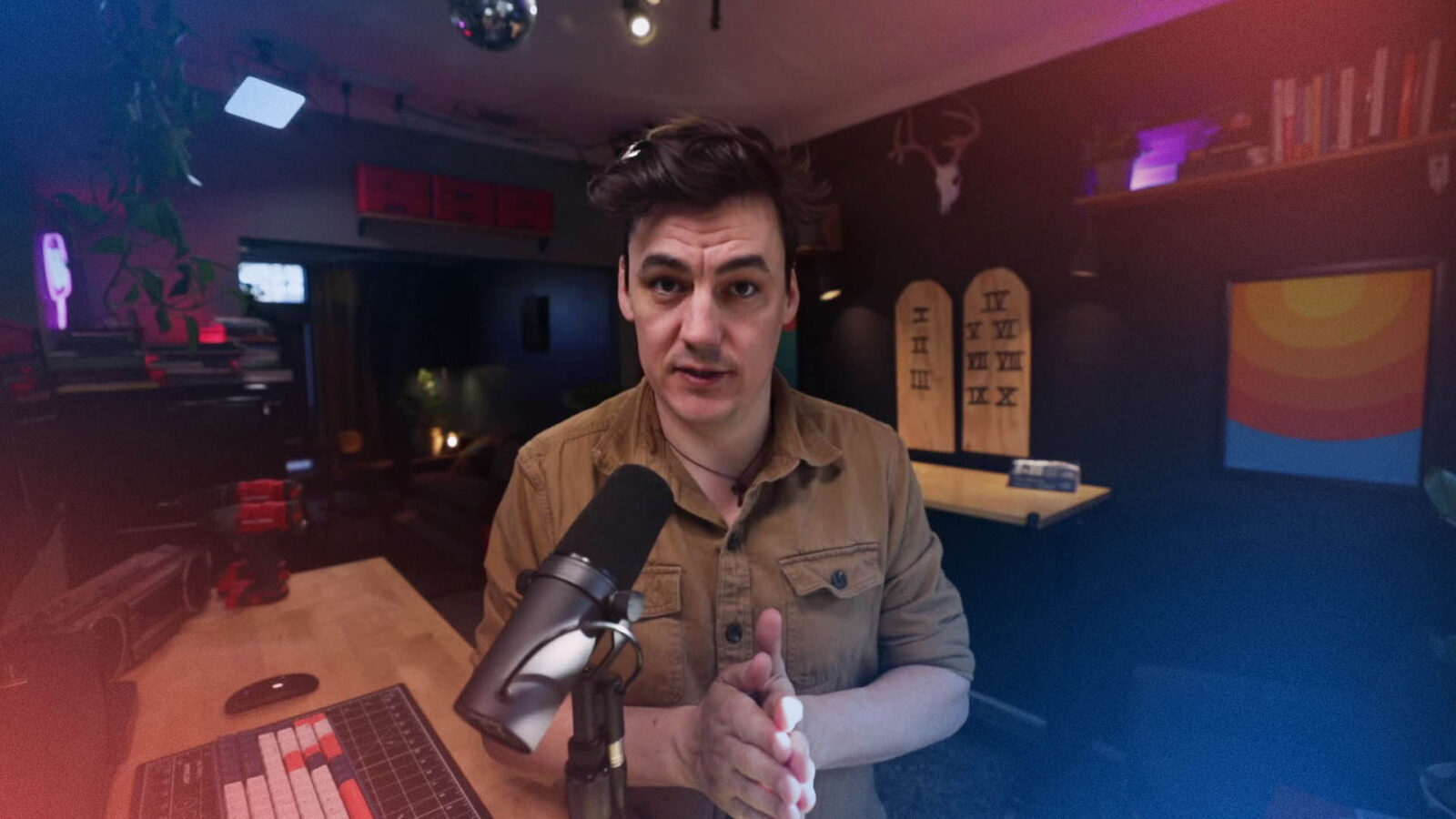Proclamation
How the Laws of Nature and Morality are Connected

In this episode, expert evangelist Julianne Stanz joins to talk about the challenges and importance of discussing the Ten Commandments in the context of evangelization.
(00:00) In the opening of this episode, Julianne Stanz discusses the challenge of integrating the Ten Commandments into evangelization, emphasizing the need to present the fullness of the Gospel. Edmund and Julianne discuss the “believe, behave, belong” concept, explaining that belief and belonging precede behavior. Julianne highlights the nuanced approach required for different individuals, stressing the importance of acknowledging the commandments as guideposts for moral and natural law in fostering meaningful discussions, especially with teenagers.
(06:46) Julianne highlights the importance of presenting the Ten Commandments not merely as intellectual pursuits or behavior modification but as an invitation to experience God’s life. She draws parallels to discipleship, emphasizing a close relationship with God. Edmund and Julianne discuss how young people may inadvertently make idols. Additionally, Julianne shares insights from young people’s perspectives she learned through interviews and suggests using the Socratic method to foster meaningful conversations with children.
(13:09) The conversation delves into the challenges of discussing morality and the Ten Commandments, emphasizing the danger of presenting as experts in all aspects of the Church. The dialogue underscores the power of authenticity, suggesting that modeling vulnerability and engaging in the learning process together is more effective than perfect presentations. Julianne shares more insights from her research, highlighting the deep pain young people harbor regarding mental health and identity. She addresses the silent struggles and desire for face-to-face conversations young people experience. Parents express pressure to have everything figured out, while Stanz recommends simple traditions, like blessing children’s shoes, as impactful ways to instill faith at home.
(21:02) Julianne advises catechists and parents not to fear presenting the Ten Commandments or facing tough questions. The discussion turns to authenticity, curiosity, and gradual teaching, emphasizing the Holy Spirit’s role in evangelization.
(28:08) The conclusion of the podcast directs listeners to explore additional resources and Julianne Stanz’s new book, A Survival Guide for Catholic Parents.
Proclamation

Explanation

Connection

Edmund Mitchell: Hi everyone, and welcome back to The Real and True Podcast. I’m one of your co-hosts, Edmund Mitchell, and very excited today for a podcast episode with Julianne Stanz. She’s been on this podcast before; you probably know her. She’s a nationally known speaker, retreat leader, storyteller. She’s the Director of Outreach for Evangelization and Discipleship at Loyola Press and is serving as a consultant to the USCCB Committee on Evangelization and Catechesis. She’s written a ton of books but her most recent one is The Catholic Parents’ Survival Guide. Did I get that right, Julianne?
Julianne Stanz: You did.
Edmund Mitchell: Awesome. So we’re going to be talking about Unit 29 in Real And True. We’re introducing the idea of the Ten Commandments. We’re in Pillar Three, Life in Christ, and we’re at this point where we’re introducing the 10 Commandments. And I’m so excited to have you on to kind of talk about this and talk about your book a little bit as well, and talk about the 10 Commandments. We were just talking before the podcast about how sometimes, especially when people do get passionate about evangelization, it’s like, “Man, the Commandments. That’s not fun stuff to talk about. That’s not as interesting or as exciting.” Or maybe people don’t see it as life-changing to present the 10 Commandments to people. But anyways, just happy to have you on and wanted you to maybe introduce us a little bit to some of the pastoral concerns or just issues that you see come up in regards to the 10 Commandments, especially in the context of evangelization.
Julianne Stanz: As a great opening actually, is to talk about how difficult it is. Because I think it’s easier to stay in that moment of relationship and Jesus and what He did and what He asked us to do. But the fullness of that is always within the context of the law and the Commandments. And so, today, with people feeling very constrained around laws and pushing back against authority, all of that kind of comes together in the conversation. And I think it’s a huge mistake and a disservice to young people if we don’t give them the fullness of truth. Because that’s what Jesus called us to, is the fullness of truth. And I think sometimes we can have a peculiar affinity for one or two teachings and kind of have spiritual amnesia and gloss over some of those other challenging tenets. And I think we really have to search our hearts, especially when we are working with young people or our own children, is to not be afraid to present the fullness of the Gospel because that’s how people come to true conversion.
Edmund Mitchell: Yeah. There’s this phrase that goes around ministry circles a little bit, this “believe, behave, belong;” this whole idea of “Which comes first?” Could you explain that? Maybe this is related a little bit because I also think that there are some people, or maybe even some parents, who all they’re concerned about is making sure that everyone’s behaving correctly or behaving the right way. I remember when I was at the parish as a youth minister, sometimes I’d have parents come up to me, “We just gotta make sure these kids aren’t doing X, Y, and Z. That’s why I’m bringing them here. You got to tell them to not do X, Y, or Z.”.
Julianne Stanz: I think you actually gave a really good example of this, which is this tension between belief and behavior and belonging. And so research suggests that young people today will not believe unless they belong, and they will not behave unless they believe and they belong. I think it’s a bit more nuanced sometimes than that. I think conversion is not behavior modification. It’s not just about getting people to do the right things. However, when we look at the virtues and cultivating good habits of faith, I think that they can be a great way to bring young people into the discipline of the faith. Because disciple, the word “disciple” means “student,” and the master that we’re learning from is Jesus. And I think as long as we are careful and we are listening to where young people are at, we can bring along the conversation so they feel like they belong, even if they don’t understand all the time what we’re asking them to believe in when they’re part of a group where we are expecting them to believe.
I think actually that can bring people along in its own way. So I think it’s nuanced. I think that dichotomy has been really played out. I think there’s a lot of wisdom in it, but I also think there’s a unique gift each child brings that you have to listen for. Some people are rule followers. I was just listening to a podcast with a friend of mine, and she started by saying, “I’m a rule follower, so behavior is really important for me.” And the person on the other end who was interviewing was like, “Well, I am not.” But you can hear that tension sometimes. Older children, for example, can have that kind of pathology of rule-following, and it’s not a bad thing. That’s what I want parents or catechists or teachers to hear. But I do think we have to bring that fullness of tradition together for young people and to allow them to see themselves in that.
Edmund Mitchell: Yeah. If someone was asking you directly, “How are the 10 Commandments important in evangelization in particular?” How would you answer that shortly for them? How would you place them in a way that sets them up to then talk about the practical ways for answering tough questions and things like that?.
Julianne Stanz: You know, I read once that there’s 10,000 laws that have been created around what the 10 Commandments actually are for and about. And I think it’s so true. And I think when you work with young people there’s a tendency sometimes to think about skipping over; not maybe leaning into some of the ones because they’re so difficult. But actually, young people’s brains and research tells us particularly kids around 15, 16, that are moving into what’s called formal operational thought. They are dealing with more concepts that are complex on a daily basis. And the 10 Commandments could be looked at very simply. So for younger children, they can be looked at “Thou shall not kill.” But when you get to formal operational thought with teenagers, for example, the nuances around self-defense, that’s where you can have some really great conversations. And so I would say, the 10 Commandments, they’re a guidepost for moral law and the natural law for each one of us because they are rooted in what’s good for us as human beings. And a loving God wants us to live out our best and most abundant life so that we can be called to make saints and be saints. And we can’t skip over the 10 Commandments.
Edmund Mitchell: I love when you talk about discipleship, and especially the following after the master. And I love this. I feel like this is something also that’s missed. I’ve had catechists who present the 10 Commandments like this intellectual pursuit or behavior modification. Instead, what came to mind is when Jesus asked the first disciples to follow Him. Or when people encountered Jesus and wanted to follow Him, they wanted to know “Where do you sleep? Where do you stay? Where are you eating?” And this idea in the time of the New Testament, that if you were apprenticing under a rabbi, you wanted to be covered in the dust of his sandals. You wanted to be so close to him and try doing all the things the way he does them to experience his life. And the 10 Commandments are this invitation for God. God’s saying, “Hey, here’s how to experience my life in the tangible world. Here’s how to live in right relationship.” And it’s this exciting thing, not just “Oh, just make sure we don’t do these things; these certain things that we arbitrarily made up.”
Julianne Stanz: Yeah. I think when we emphasize, particularly with young people, constraint, rather than the freedom that living in accordance with God’s way for us. I think that gives young people a different lens into them. And I was thinking about the first Commandment to place God at the center of our lives. And I was having a conversation actually with a group of young people last week. And the way that we got at this was really interesting. We talked about the ways that we naturally make idols in our own lives. Human beings are wired to believe. And so let me just break this down for those who are listening who might be shocked by that. How do we make our own idols? Well, we have a celebrity culture; we have a sporting culture. We have a financial culture which exalts those who make money.
All good things to play sports; to have talent. But when we make them idols, when we make them gods in and of themselves, we displace the role of God in our own lives. And so the way to get out of commandment like that is actually to talk about our tendency to believe and then to self-define that belief rather than allowing God to define how He wants us to live. And so the teenagers that I was with, they started looking at what they were wearing and started asking some difficult questions around “Are we idolizing brands and people? And have we displaced the idea of God in our lives?” When you start with that, then you can kind of look at the Commandments as nuanced facets of a relationship with God who loves us and wants to be in relationship with us.
Edmund Mitchell: I love that. You mentioned a little bit that you did for your book, some interviews where teens or young people were telling you the tone that they wished their parents would talk to them about things. Could you share a little bit about that?
Julianne Stanz: Yeah. So for The Catholic Parent Survival Guide, one of the things I really wanted to lean into was not just my own wisdom as a parent, which is I live in Wisconsin and I’m from Ireland. And so our lives are colored by that reality here. And I wanted to hear from parents of diverse backgrounds. I wanted to hear from single parents. I wanted to hear from grandparents who are raising their children. I wanted to hear from parents who are going through divorce, all of that, and find the wisdom at the center of that. At the same time, I was acutely conscious of the fact that young people were telling me that faith seemed like a bunch of adults talking to them about what they didn’t know. And that was interesting for me that our faith is often adults at the center of the conversation. And then, “Oh, by the way, do you have anything to contribute?”
And so a lot of the young people, one of the questions that I asked them, which was really eye-opening for me, was, “What do you wish your parents knew about how difficult it is to be a young person today?” And they got really emotional about that. And the pressure to conform, to be a good learner, to be a good citizen, to have it all together, in a culture where young people are experiencing record mental health issues and anxiety and depression are rampant. And so they were saying things to me like, “I wish that my mom and dad or my grandma or my aunt or uncle,” whoever it was, “would allow me to share my own experience.” So not just “Tell me what the Church teaches,” but really engage in conversation and to be open to my opinions on that rather than just seeing themselves as the one who is the authority.
And when I realized that young people favor what I call more of a sage—not a sage on the stage kind of an approach—but a guide on the side. We hear that a lot. But they wanted someone to come alongside them. Like you said, Edmund, as an apprentice, someone who’s walking the journey, and vulnerability sharing weaknesses was very important for them. And so one of the practical tactics that I help parents with is very simple. It’s from the Socratic method, and parents are like, “What?” So it’s very simple. It’s just basically when your child asks a question, like, let’s just take one, like, “Why do we have to believe in the 10 Commandments?” Reframe that question back. “That’s a great question.” First of all, the affirmative right away. And then “Why do you believe that we have to talk about this?”
What you’re doing there is you’re checking for prior understanding. It allows you also to listen to how much information they’ve collected from multiple sources. And it allows you to sit in the posture of listening rather than being the determinant of where the question is going. Because the next question then, depending on what you learn, could look very different. And so I think as adults, I think we have to really lean into that more with young people and really model better listening skills. Says the person who just talked for five minutes there.
Edmund Mitchell: No. I think that’s such a good point, especially when we’re talking about the 10 Commandments and morality. I think oftentimes, especially in maybe newer evangelists or catechists, there’s this—I don’t know where this comes from—but there’s this fear that “If I don’t explain everything perfectly…they need to know it exactly how it needs to be said. Otherwise, they’re lost.” And I remember one of the things that really challenged me in ministry in general was that—I’m gonna get the phrasing confused—but it was something like “You train people to need whatever you draw them in with.” There was something to that extent. But this idea was that if we’re giving these perfect expert talks, and that’s what evangelizes someone, then in a way you’re telling them the next time they want to find information…you’re giving them this model of “I need to find experts to just teach me.” Sometimes in my experience, the more powerful and deep formation comes from core team members; these so wonderful adults, dads or moms or part-time, stay at home, whoever, who are just like, “I’m just here with you. I’m a little bit older than you, but I’m not sure I know all of this super well.” And them modeling “How do we find
Julianne Stanz: out together?” Yeah.
Edmund Mitchell: Yeah. And that’s your point that sometimes is so much more effective. Like “Let’s find this out together. Why do you think this is so important?”
Julianne Stanz: Yeah, I think there’s a place for people with expertise. And there always is in every sphere of life. But I think there is a danger, like you said. I think it’s really wise, Edmund, is that positioning ourselves as experts in all areas of the life of the Church. I think young people hear that and they’re like, “How is that possible?” And it’s not. You can be very, very knowledgeable about many aspects of the Church’s teachings, and you can be living in a way that’s very contrary to what our Church is calling us to; what our faith is calling us to. And I think young people see and desire authentic witnesses, not just teachers. Teachers are really important communication of information for transformation. What was interesting to me is the research that I did gave me some cues as to when catechists and teachers talk about the 10 Commandments with a giant eye roll for certain commandments, young people could pick that up even if it wasn’t obvious to the teacher and the catechist.
So like, “Mrs. S always skips over this,” they make that connection. Or “She really doesn’t believe the Church’s teaching on this for whatever reason.” And they pick that up and it forms a narrative.
Edmund Mitchell: Oh, interesting.
Julianne Stanz: That was interesting for me. So I tell teachers and catechists, when you’re teaching difficult areas of morality that you yourself are wrestling with, it’s even more important for you to pray before you teach; to reflect on what you really, really think about these areas of the Church and why. And then what unconscious messages are you sending to the young people that are listening in? And from that, break open the teachings together, but be very, very careful of biasing young people toward areas that you are having difficulty with. It’s okay to be like, “When I saw this for the first time, I was struggling with this, but here’s what helped me make sense of that.” That feels authentic.
So I heard that over and over again from young people. We really know how they feel about this area. Because they just keep coming back to it, which tells us that they’re avoiding this area for an interesting reason. And they’ll make that nature abhors a vacuum, it will fill a gap. And so if you are having difficulty talking about a particular Commandment, I think it’s okay to acknowledge that and say, “This is an area that has been really challenging for me, but we’re going to look at it together. And I want you all to bring your thinking, your wisdom, your life experiences, so that we can find a way forward.” That feels authentic, I think.
Edmund Mitchell: Yeah. That’s awesome. What else did you find in your interviews of both parents and teens that was particularly surprising around this?
Julianne Stanz: Great question. There was a lot. The pain that our young people were withholding. I expected it, but it was so very, very deep around mental health and around their identity. And seeing themselves as children, beloved children of God, was really, really hard for them. So because identity gets mixed up with messages from social media and the world, this has been a very, very confusing time for young people around who they are as men and women. And all of the language that’s changing for them is difficult. They felt like they didn’t know what to say about certain things, and so they just found it easier to say nothing. So it’s a silent world. And that was one thing I realized. They talk a lot online and through their computer and their text messages and Snapchat, but face-to-face conversations around difficult issues, they desire that, but they don’t know how to do that. So creating simple things, like creating rules of engagement, when you’re talking about this. “So we are going to talk about the 10 Commandments today. Here are some of the rules that I thought would be helpful, but what do you see? Okay, no personal attacks, everything stays inside the room.” Creating that circle of trust; it’s really important today.
On the flip side with parents, what I heard a lot of was, “I dread my children’s questions because I don’t know how to answer them.” And then young people were saying to me, “I can tell my parents dread my questions so I’ve stopped asking.” And I found that really sad. The other thing is a lot of parents told me they felt a huge amount of pressure to have everything figured out when it came to raising their children in faith. And that they felt like because we model a faith that’s very “teacher:” “I teach you this and you learn this and you internalize it,” versus a faith that’s kind of witnessing in the home through prayer and song and music. Parents didn’t know how to bring their whole self as parents to the conversations about faith. And one parent actually told me, she said, “I thought it would be like sending my child to this kind of school, making sure we went to this kind of parish, surrounding myself with this kind of friend group.” Which are all wonderful things. I want your listeners to hear that. She said, “I thought that would be the guarantee of keeping my children engaged in their faith.” And what I’ve realized is, it’s simple things. I had told her a couple of years ago, when you put your children’s shoes on—because when little kids cannot tie their own shoe laces, you know how many times those shoes go on and off every day—make the sign of the cross over the soles of their feet say, “May God bless you today and may God guide your steps” when they’re leaving the house; make the sign of the cross over there.
It’s those kinds of things that parents told me. Those were the traditions, those were the most meaningful ways that faith was communicated versus “I sent them here, we went to camp.” Those were important, but were peripheral to the central experience in the home.
Edmund Mitchell: Yeah. I think we’ve given some of this advice already, but I just again want to talk to what would you say to those catechists or the parents who are just scared; scared to present the Commandments or scared to get difficult questions or feel like they have to have it all together? Especially after what you’ve heard from some of those teens or these youth. What would you kind of say in closing to the parents that are so scared of like, “Man, people are going to ask me hard questions” or catechists that are thinking that as well?
Julianne Stanz: Yeah. Don’t be afraid. The Lord says to us, “I go before you always.” So in every interaction that you have with a young person, God has already gone ahead of you. And trust that. So He’s there, and acknowledge that God is there in those conversations. I don’t think we pray enough through those conversations. Something as simple for catechists of acknowledging their own fear; praying before class, but also like, “Okay, we’re going to tackle a difficult conversation today, and these areas may touch on parts of your life that are painful. Let’s pray about that.” So to bring prayer into everything. Prayer, but then get very, very practical around tangible realities that young people are facing where they may bump up against this. Like the example I gave with the idols was, that cracked open such a huge conversation for us around all the ways people have made idols.
And I was fascinated to hear their conversation. From there, you can introduce the Church’s teaching really beautifully. The other thing I would say is: Recognize that the 10 Commandments are a progression in relationship. So they’re deepening levels of formation. And if you don’t know the answer, say that. My son asked me a question, “What’s the closest planet to heaven?” And I said, and thank God I had the grace to be like, “Zip the lip, Julianne.” I was like, “Sean, I think that is such a good question. I really need to think about that.”
Edmund Mitchell: Yeah.
Julianne Stanz: And I came back to him a week later and I said, “I think the closest planet to heaven is Earth.” And he said, “Why?” And I said, “Because this is where Jesus lived. And this is where our walk of faith happens.” And to me, that made sense. But I asked him, I said, “Does that make sense to you?” And he said, “Well, let me think about it.”
Edmund Mitchell: Oh wow. That’s awesome.
Julianne Stanz: Yeah. And I think we want to promote curiosity about faith. And one great teacher tactic or catechist tactic around this is to put up the 10 Commandments and then to think about, to brainstorm, all the ways that young people find the difficulty; the dissonance in these; the paradox. And then I remember doing this too. I’m dating myself here, but we had to go and find newspapers to talk about different things that were coming up in the news. But they can recall that easily because they’re seeing it on social media. But just to throw all those out there, and then really to take a couple of areas and just dive in gently, but progressively. And I mean progressively by gradually unfolding the teaching.
Edmund Mitchell: Yeah. I love this idea. I love this idea of asking teens. It’s one thing to say, “Yeah, you should not lie. And that’s the commandment and we have to follow it.” But I love this idea of saying “How have you found this difficult? Or what about this is difficult?” Because oftentimes the first person, the first thing people think of when—especially the commandment on not committing murder—is people immediately are like, “Well, what about self-defense? What about wars?” And if you’re not in this position of “I’m the expert, I’m going to explain that this makes sense very easily,” it’s better to just be like, “Hey, what is hard about this? What’s going to be difficult about this? What is applying this? What are areas where applying this is going to be kind of tricky for us to understand?”
Julianne Stanz: Yeah. I had a 10th grade class and we dived into “Thou shall not bear false witness against your neighbor.” And I will never forget this. I had a young person who said to me, “I think of all the commandments besides the first commandment; that this is the one that is the easiest, but is the most dangerous.” And I said, “Why?” And they said, “Because bearing false witness involves lying.” And I have to be careful how I say this because it was so profound at the time; I was just blown away. But they said, “I feel like that commandment to steal the reputation of another is actually like a death in a sense to that person’s right to have a good name. And I think from that come a lot of the issues that we have in life. We project onto others.”
So he went in a really, really interesting direction with just this one area. If we didn’t slow down to break that open and allow the young people to share how they really felt about this, we would’ve missed that wisdom. Young people have incredible wisdom. And I would say too: even if they say they’re skeptical and they don’t believe, don’t negate the ability to plant a seed for goodness in this conversation. Some of those kids, some of those teens, are listening in and they are forming an opinion based on the dialogue. And that is very valuable.
Edmund Mitchell: Yeah. It’s reminding me that oftentimes it can be really easy to slip into this anxiety that I have to be the one to do something perfectly, either as a parent or as a catechist or evangelist. And if I don’t do this the right way, then this person is lost; this person won’t meet Jesus or they’ll be ruined somehow. And I like that you said that Jesus walks before us, and it reminds me of—I think it’s Evangelii Nuntiandi, the Church’s document on evangelization—where it says, “Techniques of evangelization are great. Techniques and methods are great, but nothing can replace the
Julianne Stanz: gentle action of the Holy Spirit.”
Edmund Mitchell: I think that’s so great too, to know that God is more concerned about other people’s salvation and souls than even we are. Even in our most concerned, God’s doing more work, and that Jesus is the teacher and the taught in the moment. This is a wonderful conversation filled with so many practical things that people can take away. Where can people go to find more about the projects you’re doing; things you’re doing, but also find your book?
Julianne Stanz: Thank you for sharing that. You can find me anywhere. You can Google me and I pop up on several places and you can connect with me. You can email me through my website, juliannestanz.com. And people do. They email me. I just had an email yesterday from a parent out in California and she wanted a very specific question around the Church’s teaching on morality. How does she introduce this to her 14-year-old son? So find me there. My books are published by Loyola Press, The Catholic Parent Survival Guide. You can order anywhere. I love to suggest small Catholic bookstores because they need your patronage, but you also can find me on some of the bigger online retailers too.
Edmund Mitchell: That’s awesome. Well, thank you so much for being here, Julianne.
Julianne Stanz: Anytime. Happy to chat with you.
Edmund Mitchell: Well guys, thanks for listening to this episode. This is, again, the Real True Podcast, where we are on a mission to unlock the truth and beauty of the Catechism and help people around the world encounter its pulsating heart: Jesus Christ. You can visit realtrue.org to watch or listen to the podcast, but also all of the videos that we’re creating. Yeah, I’d really encourage you. We have some really great ones in this particular pillar on morality; on life in Christ. So yeah, thanks so much. If you got anything out of this episode or if you have questions around this for future episodes, feel free to comment either on the YouTube video or send us an email. But yeah, we thank you so much for listening and hope that you’ll join us next time.
U.30 — CCC 1716-1729

In this episode, Edmund and Emily discuss the Beatitudes, which the catechism reminds us is central to Jesus’ preaching.
WatchU.28 — CCC 1949-2051

In this podcast, we’re joined by Fr. Stephen Pullis to discuss better catechesis on grace and its relationship to our effort.
WatchU.27 — CCC 1803-1948

In this podcast, we’re joined by Dr. Scott Sollom to discuss better catechesis through the lens of the theological virtues.
WatchU.26 — CCC 1730-1802

In this episode, Edmund Mitchell interviews Dr. Joseph White about psychology and catechesis. Dr. White, with a background in psychology and experience in catechesis, shares insights on navigating the third…
WatchBy submitting this form you consent to receive emails about Real+True and other projects of OSV.